Aug. 10 to Aug. 16
They called him the “No Problem Doctor” (沒關係醫生) because that’s what he always told his patients when they couldn’t pay up. Operating the only clinic in Changhua County’s Pusin Township (埔心) during the 1950s, Hsu Tsai-chih (許再枝) knew that life was difficult in his remote hometown.
“They barely had enough to survive, so it was pointless to chase after them for the money,” an 81-year-old Hsu told the United Daily News in 2002. “I just went with the flow, some offered to pay me back years later but I had already forgotten about it.”
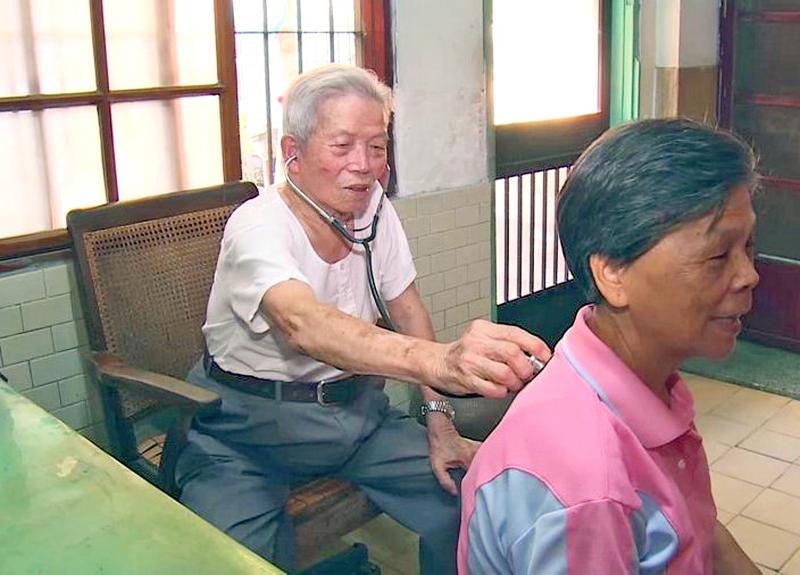
Photo: Chen Kuan-pei, Taipei Times
Sometimes, patients who received Hsu’s help for free felt too ashamed to go see him again, and their conditions worsened. The affable physician reportedly lost his temper whenever he found out, yelling at the patients for neglecting their health.
Hsu had no intention of retiring at the age of 81, working tirelessly for another 10 years. He received the Medical Dedication Award (醫療奉獻獎) three years later, his acceptance speech consisting of one sentence: “I’m old, I don’t talk much and I’m not good at speaking.” He died in his home on Aug. 12, 2016.
TIRELESS PHYSICIAN
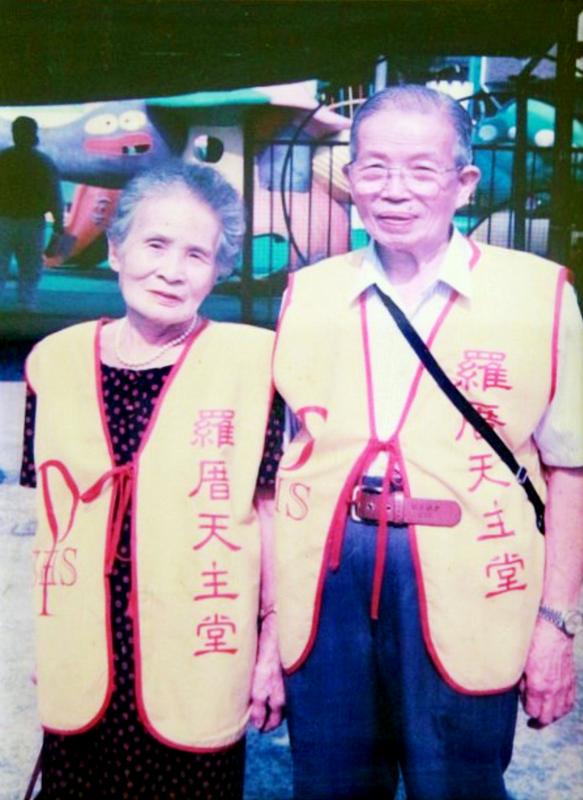
Photo: Chen Kuan-pei, Taipei Times
There are no biographies on Hsu, except for a picture book published by the Pusin Township Office in 2017.
The earliest available article on Hsu ran in the United Daily News in 1999, describing the then-79-year-old as the “only physician in Lotsuo (羅厝) village” who had no intention of retiring.
“Over 50 years, Hsu has treated four generations of the same families, and many old patients refuse to see anybody but him,” the report states. “They pleaded with him to continue practicing, and he is happy to do it too.”
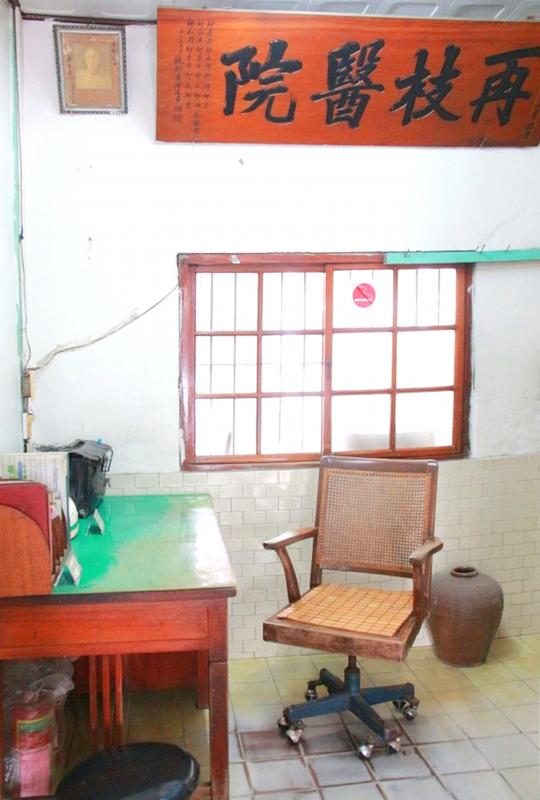
Photo: Chen Kuan-pei, Taipei Times
In response to his children asking him to retire, Hsu said, “It makes me happy to cure other people. It’s my interest and my responsibility. Why can’t they just let me be a happy doctor?”
Hsu was born to a poor farming family in Changhua’s Tianjhong Township (田中). He left home at the age of 14 to train as an intern at his uncle Chen Kun-yuan’s (陳坤源) clinic in Chiayi, staying there for seven years before receiving his license. When he was interviewed in 2014, he was still proud of the fact that he spent six months training at Taihoku Imperial University (today’s National Taiwan University).
He later served as a military doctor for the Japanese in the Philippines during World War II. The details of his service are unclear — one article maintains that he couldn’t stand the discrimination against Taiwanese in the Imperial Japanese Army and eventually deserted, only making it home in 1950. Several other articles state that he served for four years before he was discharged in 1948 — which is unlikely since the Japanese were defeated in 1945.
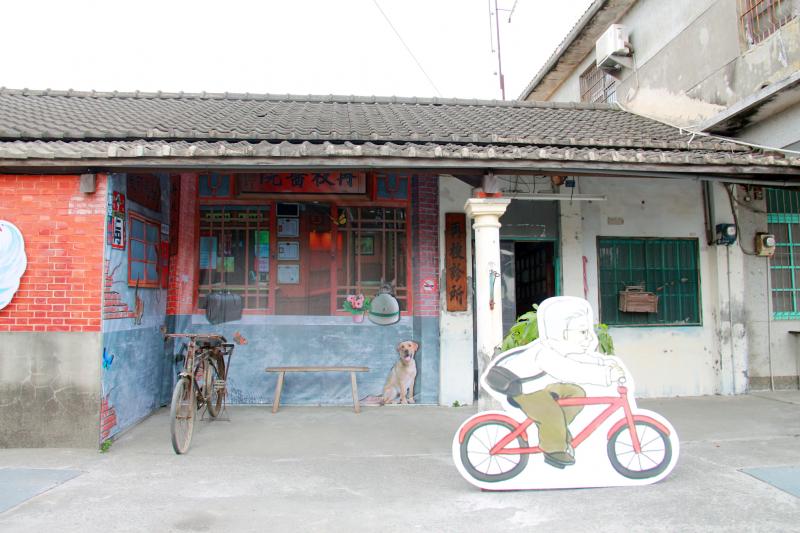
Photo: Chen Kuan-pei, Taipei Times
Regardless, Hsu re-obtained his medical license under the Chinese Nationalist Party (KMT) in 1952 and opened the only clinic in Pusin Township. Local medical resources were scant in those post-war years, and Hsu saw up to 200 patients a day, doing everything from internal to external medicine to obstetrics — once delivering eight newborns in a night. He often ran into villagers in their 50s or 60s who would exclaim: “You delivered me!”
SAME MEDICAL BOX
Hsu also served the surrounding communities, hopping on his bicycle with his medical box and traveling as far as today’s Yuanlin City, which was over 10km away. He was known for even heading out during typhoons, saying, “the pain of the patients cannot wait.”
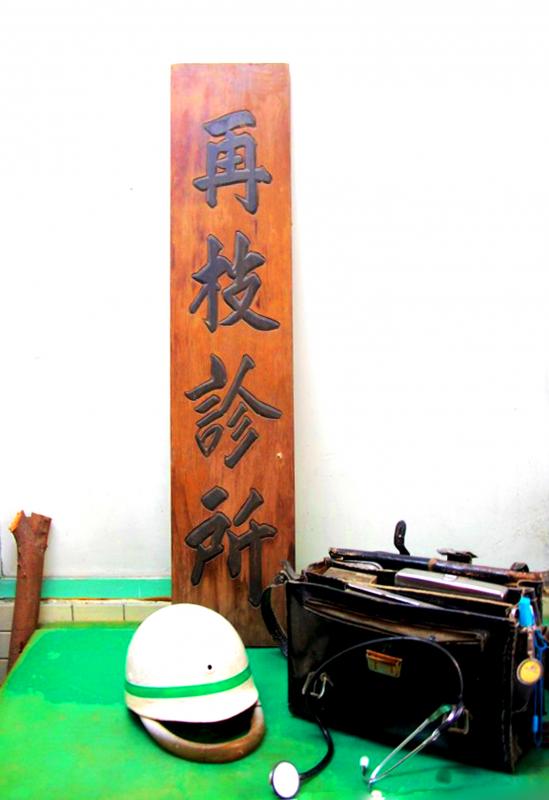
Photo: Chen Kuan-pei, Taipei Times
The 1999 article notes that Hsu was still using the same medical box as he did in 1952, and made few upgrades to his clinic, retaining the original wooden signs and furniture. Instead, he donated money to fix local roads and provided the land to build Lotsuo Elementary School.
In 2001, he was nominated for the government’s Medical Dedication Award, and although he didn’t make the final cut, he told the United Daily News, “Just being nominated is an affirmation of my ability ... and it inspires me to continue my dedication toward medical work.”
Hsu was a devout Catholic and attended the Lotsuo Catholic Church, which was built in 1880 and is considered the oldest of its kind in central Taiwan. In 1858, the Qing Empire reversed its ban on Catholicism, and missionaries began arriving in the Kaohsiung area soon after, spreading its influence in all directions.
In 1875, a Lotsuo merchant named Tu Hsin (涂心) heard a sermon during a business trip to Kaohsiung and was deeply moved. After he returned home, he gathered family members and prominent locals and invited the church to send a priest to the village. Sixty-three villagers were baptized the following year.
The church has been rebuilt twice and contains many relics, including Taiwan’s first publication using a Latin printing press.
Taiwan in Time, a column about Taiwan’s history that is published every Sunday, spotlights important or interesting events around the nation that either have anniversaries this week or are tied to current events.

For many centuries from the medieval to the early modern era, the island port of Hirado on the northwestern tip of Kyushu in Japan was the epicenter of piracy in East Asia. From bases in Hirado the notorious wokou (倭寇) terrorized Korea and China. They raided coastal towns, carrying off people into slavery and looting everything from grain to porcelain to bells in Buddhist temples. Kyushu itself operated a thriving trade with China in sulfur, a necessary ingredient of the gunpowder that powered militaries from Europe to Japan. Over time Hirado developed into a full service stop for pirates. Booty could

Politically charged thriller One Battle After Another won six prizes, including best picture, at the British Academy Film Awards on Sunday, building momentum ahead of Hollywood’s Academy Awards next month. Blues-steeped vampire epic Sinners and gothic horror story Frankenstein won three awards each, while Shakespearean family tragedy Hamnet won two including best British film. One Battle After Another, Paul Thomas Anderson’s explosive film about a group of revolutionaries in chaotic conflict with the state, won awards for directing, adapted screenplay, cinematography and editing, as well as for Sean Penn’s supporting performance as an obsessed military officer. “This is very overwhelming and wonderful,” Anderson

Social media addiction has been compared to casinos, opioids and cigarettes. While there’s some debate among experts about the line between overuse and addiction, and whether social media can cause the latter, there is no doubt that many people feel like they can’t escape the pull of Instagram, TikTok, Snapchat and other platforms. The companies that designed your favorite apps have an incentive to keep you glued to them so they can serve up ads that make them billions of dollars in revenue. Resisting the pull of the endless scroll, the dopamine hits from short-form videos and the ego boost and validation
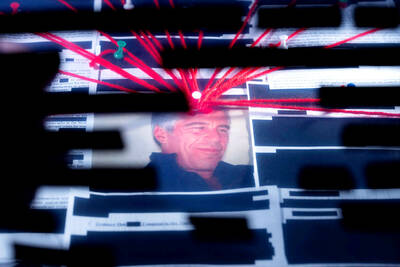
When sifting through the seemingly endless collection of documents in the Epstein files gets to be too much and Ellie Leonard needs a break, she takes a walk outside. Then it’s back to the computer. The New Jersey mother of four is among hundreds of citizen-journalists, or sleuths, absorbed by the material connected to the late Jeffrey Epstein. She’s determined to learn the stories behind his illicit sex ring and relationships with some of the world’s most powerful people, and publish what she finds on Substack. “I like a good puzzle,” Leonard said. “I like an investigation. I like things that we